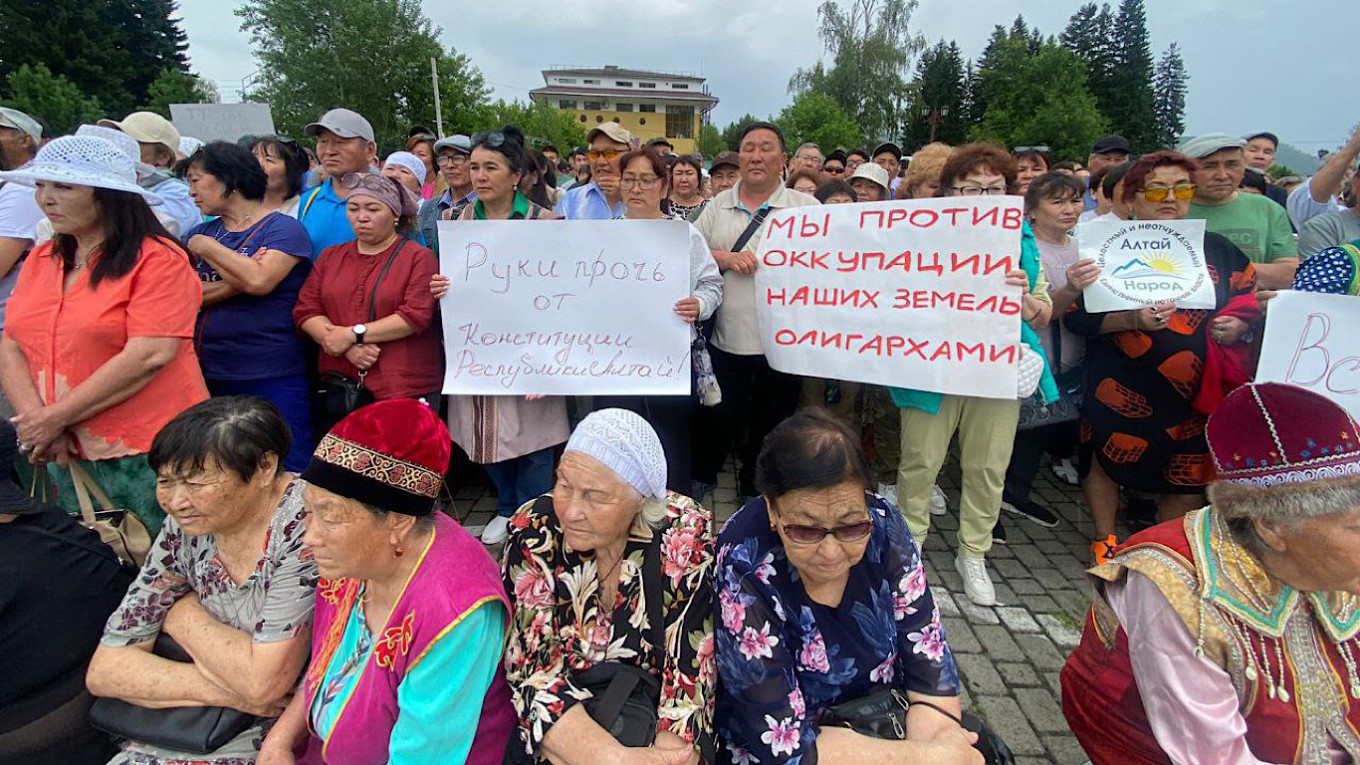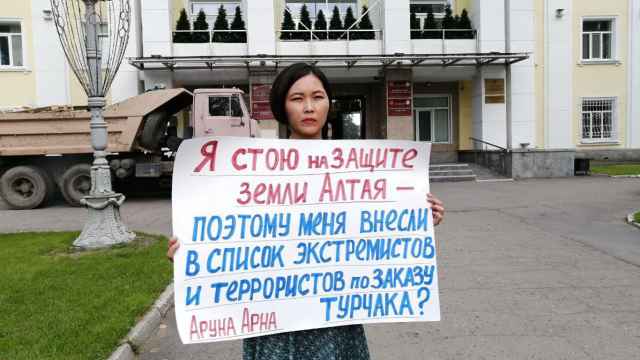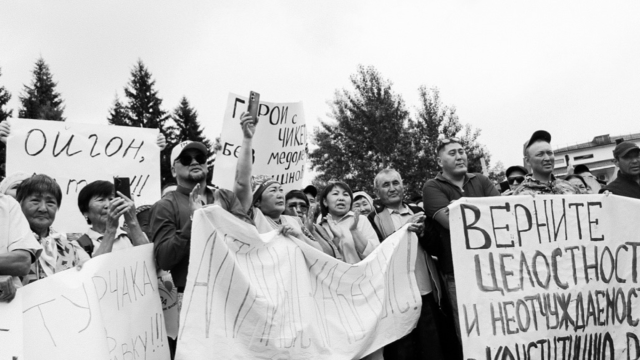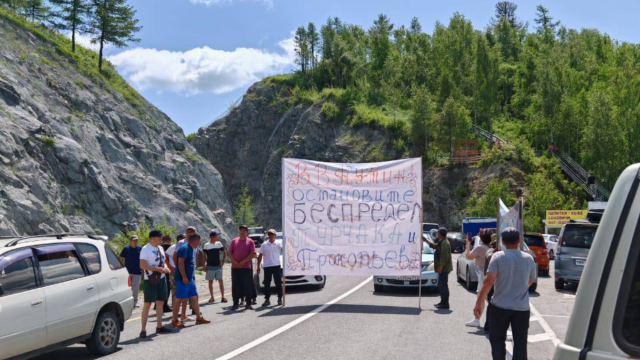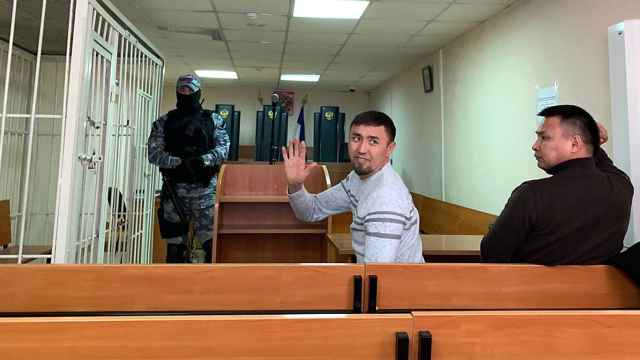Hello and welcome to this week’s edition of Regions Calling, your guide to developments beyond the Russian capital from The Moscow Times.
In June, we dedicated one of our editions to Altai, a Siberian republic of 221,500 people that witnessed a rare protest against a Kremlin-backed local government reform.
Though the republic’s government passed the controversial law just days after 4,000 residents rallied in the capital Gorno-Altaysk, the standoff was far from over.
This week, we are zooming back in on Altai to see how this vast but sparsely populated republic continues its struggle against Moscow despite growing pressure.
But first, a look at other events in the regions:
The Headlines
Petropavlovsk-Kamchatsky, the capital of Russia’s Far East Kamchatka region, has been put on high alert after a series of wild bear attacks, one of which resulted in the death of an 84-year-old woman near a local school.
“Animals are primarily attracted to readily available food sources — open landfills and harvests from garden plots. The situation could have been exacerbated by a lack of natural food [in the wilderness, such as] berries, dwarf pine nuts and salmon," a zoologist said in comments to the independent news outlet Kedr.
Authorities in the southern Rostov region declared a federal-level agricultural emergency after the area was hit by spring frosts and its worst summer drought in years.
The region, which normally accounts for roughly 10% of Russia’s wheat output, is expected to give up its position as a leading producer, with this year’s harvest volumes potentially down 20% year-on-year.
The head of Russia’s republic of Sakha (Yakutia) confirmed that the region will not proceed with a controversial Kremlin-backed reform to dismantle the two-tier system of local governance.
"In terms of ease of administration, a single-tier model is far more advantageous. However, given our traditions, the established system of territorial-administrative divisions and the remoteness of many settlements from district centers, we have decided to retain a two-tier system," local media quoted Aysen Nikolayev as saying.
A court in Russia’s Krasnoyarsk region sentenced independent journalist Svetlana Khustik to one month in pre-trial detention, local news outlet Ngs24.ru reported.
Khustik was arrested Tuesday on suspicion of violating Russia’s wartime censorship laws while freelancing for Radio Free Europe/Radio Liberty (RFE/RL) in May 2023.
The Spotlight
Months Since a Historic Protest, Altaians Still Fighting for Political Representation
“Is the question of ending the work of local councils even on the agenda?” President Vladimir Putin asked in apparent surprise at a meeting with parliamentary faction leaders in September.
“Vladimir Vladimirovich, yes, such a question was indeed on the agenda and there were several versions of how to move forward with it,” replied his domestic policy chief Sergei Kiriyenko, who then explained the government reform bill that Putin himself had signed into law in March.
Whether the Russian president pays any attention to the contents of the bills he signs or the exchange was staged for effect is anyone’s guess.
What is certain is that the municipal self-governance reform in question had the long-term backing of the presidential administration’s political bloc. And nearly six months after taking effect, the law remains widely unpopular among ordinary Russians across the political spectrum.
The fiercest opposition has come from residents of the Siberian republic of Altai.
The reform aims to do away with local government bodies in rural communities, further consolidating power in regional administrations.
This change would be acutely felt in the predominantly rural regions of the Far East and Siberia, including Altai, where just 221,500 people live on a territory roughly the size of Hungary and the capital, Gorno-Altaysk, is the only city.
For most Altaians, who live in villages, the reform leaves even fewer avenues to defend their interests within the political system.
Locals’ discontent with these potentially disastrous consequences culminated in one of Russia’s largest protests since the invasion of Ukraine, with nearly 2% of Altai’s total population rallying in Gorno-Altaysk in July.
The rally’s star speaker was activist and human rights defender Aruna Arna, who encouraged fellow Altaians to “keep acting” even after the local parliament approved the reform under the watch of Kremlin-appointed head Andrei Turchak.
Arna, 39, led by example, helping to challenge the reform in Altai’s highest court and chronicled the proceedings on her Telegram channel, where her reporting was picked up by major Russian outlets.
Arna and other local activists called on Altai’s Supreme Court to annul the parliament's vote in favor of the government reform, citing alleged violations during the voting process.
The court’s ruling on the case was announced as hundreds gathered outside the court building.
After activist and lawyer Dmitriy Todoshev, a plaintiff in the case, relayed the ruling, the crowd joined in chanting “Shame on the judge!”
Arna, in turn, called the ruling “a spit in the face of ordinary people” in a video message filmed outside the courthouse.
The activists also called on people to “contest the legitimacy of Turchak,” accusing him of violating Altai’s constitution by swearing his oath of office only in Russian rather than in both of the republic’s official languages: Russian and Southern Altai.
A week later, state financial watchdog Rosfinmonitoring added Arna to its list of “terrorists and extremists.”
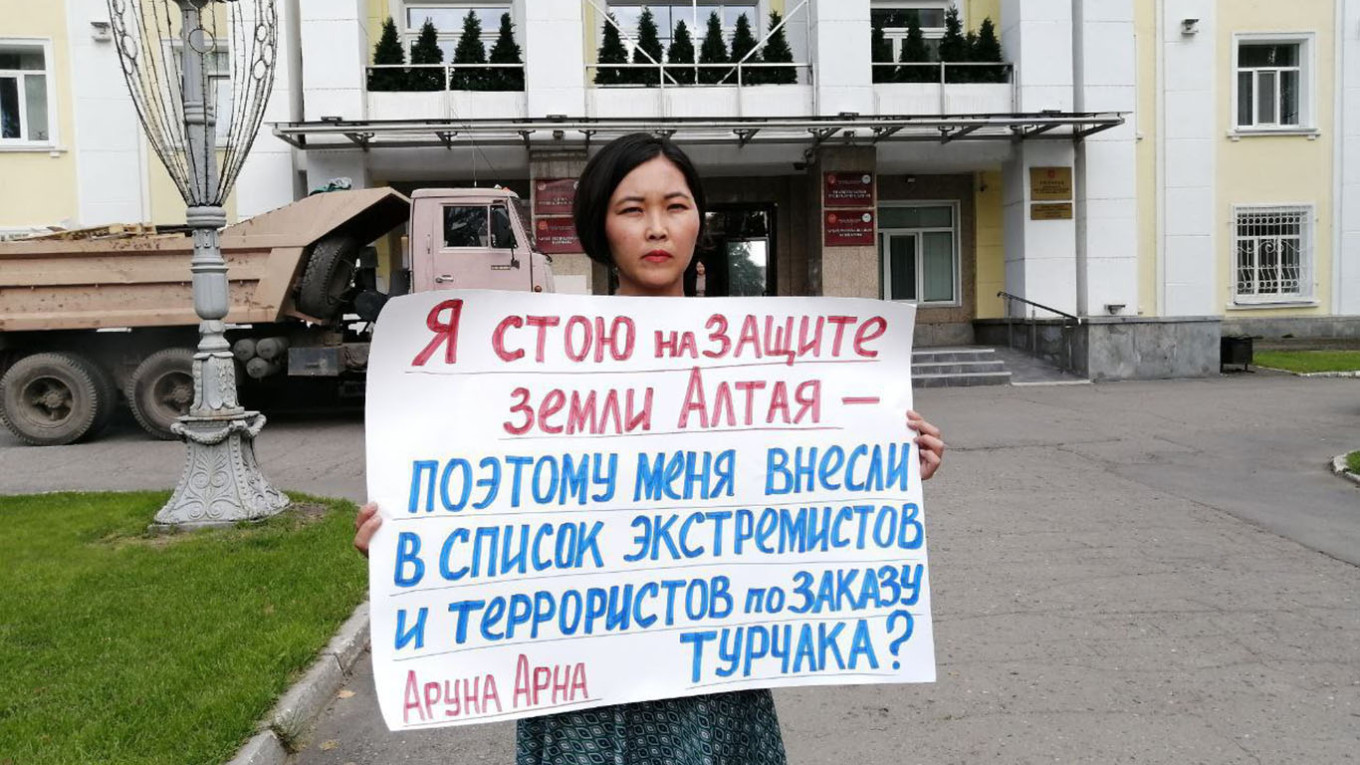
Whether the chief reason for the designation was Arna’s resolute opposition to the reform, a personal attack on Turchak, or firm support for controversial healer-turned-political figure Svetlana Lada-Rus remains unclear.
On Sept. 25, local police stormed Arna’s home and detained her following the raid.
The incident prompted an outpour of support for Arna, who was released from custody the next day with restrictions on her movements and activities.
Though media reports often single out Arna as the sole leader of the Altai protests, others are keeping up the fight in the meantime.
In Shebalino, a village of 5,100 people in northwestern Altai, 13 local deputies have refused to amend the village charter in a way that would allow for the dissolution of their council.
On Sunday, Shebalino deputies Utkul Maninov and Yakov Merketov will hold a public meeting with constituents — a gathering announced soon after authorities in Gorno-Altaysk, 119 kilometers away, banned activists from holding another anti-reform rally.
“We invite all the patriots worried about our small motherland to meet the deputies. On the agenda will be a discussion of the local self-government reform,” Merketov wrote on VKontakte.
“Our esteemed President…says: ‘The authorities must listen to the people!’ It is in this spirit that we…view this reform. We are guided by the course set by the President of Russia, the laws of Russia and the Constitution of the Altai Republic!”
- “In Altai Republic, a Kremlin-Backed Government Reform Aids the Tycoons” by Leyla Latypova
- “A Push For Local Government Efficiency in Russia Is Really About Kremlin Control” by Andras Toth-Czifra
- “Russians to Vote in Regional Elections the Kremlin Can’t Fully Script” by Leyla Latypova
Photo of the Week
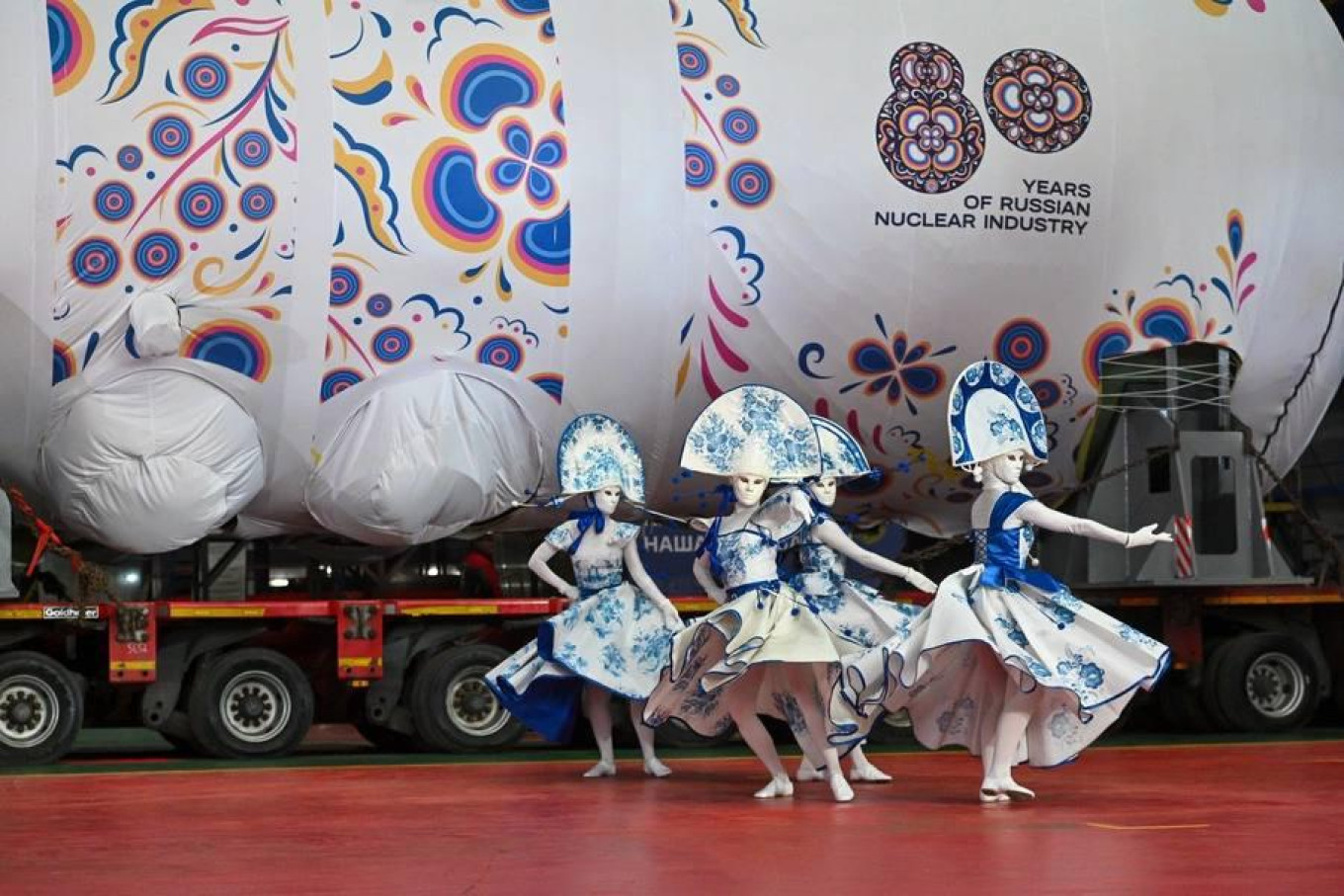
Dancers perform a traditional Russian dance at a factory near St. Petersburg during a ceremony marking the handover of two Russian-made nuclear reactors to Turkey and Egypt.
Organized by Russia’s state nuclear energy company Rosatom, the ceremony was held simultaneously at two of its plants last week and broadcast live to participants of the World Atomic Week business fair in Moscow.
Culture & Entertainment
A Message from The Moscow Times:
Dear readers,
We are facing unprecedented challenges. Russia's Prosecutor General's Office has designated The Moscow Times as an "undesirable" organization, criminalizing our work and putting our staff at risk of prosecution. This follows our earlier unjust labeling as a "foreign agent."
These actions are direct attempts to silence independent journalism in Russia. The authorities claim our work "discredits the decisions of the Russian leadership." We see things differently: we strive to provide accurate, unbiased reporting on Russia.
We, the journalists of The Moscow Times, refuse to be silenced. But to continue our work, we need your help.
Your support, no matter how small, makes a world of difference. If you can, please support us monthly starting from just $2. It's quick to set up, and every contribution makes a significant impact.
By supporting The Moscow Times, you're defending open, independent journalism in the face of repression. Thank you for standing with us.
Remind me later.



